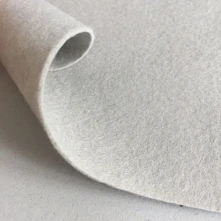Get A Quote
BIS Certification for Needle Punched Non-woven Geobags IS 16653: 2017

Needle Punched Non-woven Geobags are geosynthetic products designed to provide excellent filtration, separation, and erosion control in various civil engineering and environmental applications. These geobags are made from synthetic fibers that are bonded together through needle-punching, a mechanical process that creates a strong, durable, and permeable fabric.
They are used for applications such as soil erosion control, sediment containment, and flood protection, offering a cost-effective and environmentally friendly solution. The bags are lightweight, flexible, and capable of withstanding harsh weather conditions, making them ideal for soil stabilization and construction projects where durability and water permeability are essential.
Introduction
BIS certification for Needle Punched Non-woven Geobags
ensures that these products meet the quality standards set forth under IS 16653:2017. The Ministry of Textiles
issued the Geo Textiles (Quality
Control) Order, 2022, mandating that manufacturers of Needle Punched
Non-woven Geobags obtain BIS
certification (ISI Mark) before they can sell these products in the Indian
market. The certification process involves rigorous testing to assess the
material's strength, permeability, and performance in real-world conditions.
Obtaining BIS certification ensures that the geobags comply with Indian
standards, providing confidence to customers about the product's quality,
reliability, and safety in critical applications.
Why is BIS Certification Necessary for Needle Punched Non-woven Geobags?
BIS certification is crucial for Needle Punched Non-woven Geobags as it guarantees the product’s compliance with the stringent quality standards set by IS 16653:2017. This certification assures customers and stakeholders that the geobags are made from high-quality materials, ensuring proper functionality in soil erosion control, sediment containment, and other vital environmental applications. The Geo Textiles (Quality Control) Order, 2022, mandates that these products carry the ISI Mark to ensure their reliability and performance. Non-compliance with these standards can result in legal action under the Bureau of Indian Standards Act, 2016, emphasizing the importance of certification in ensuring product safety and environmental sustainability.
Overview of Indian Standard IS 16653:2017
IS 16653:2017 provides the technical
specifications and performance criteria for Needle Punched Non-woven Geobags used in various civil and
environmental engineering applications. The standard outlines important physical
properties such as tensile strength, elongation, water permeability, and
durability, which are essential for ensuring the geobags' effectiveness in soil
stabilization, erosion control, and other applications. It also includes
guidelines for the materials used, testing methods, and quality assurance
procedures to ensure that the geobags meet national standards. Compliance with IS 16653:2017 ensures that the geobags
provide the required performance and environmental protection in various
conditions, making them suitable for long-term use in infrastructure and
environmental projects.
Process for BIS Certification
The BIS
certification process for Needle Punched Non-woven Geobags involves multiple
steps, designed to thoroughly evaluate a product's compliance with the required
standards. Here is a general overview of the certification process:
1. Application Submission: Manufacturers
must submit an application form along with required documentation to BIS.
2. Documentation Review: BIS reviews the
submitted documents to ensure completeness and correctness.
3. Factory Inspection: BIS officials
conduct an on-site inspection of the manufacturing facility to assess the
production process and quality control measures.
4. Sample Testing: Product samples are
taken and tested in BIS-approved laboratories to verify compliance with Indian
standards.
5. Certification Grant: Upon successful
completion of the inspection and testing, BIS grants certification, allowing
the manufacturer to use the BIS mark on their products.
Documents Required for BIS Certification
To apply for BIS certification, manufacturers need to submit the following documents:
● Application form
● Manufacturing process details
● Quality control plan
● Test reports from BIS-approved laboratories
● Factory layout and equipment details
● Proof of business registration
● Product specifications and technical details
● Declaration of conformity to Indian standards
Additionally, manufacturers may be required to provide proof of compliance with environmental and safety regulations, depending on the specific type of product being certified.
BIS ISI Mark Certification Costing And Timeline
To Know The Process in Detail, Please Visit:
Under BIS Registration Products ISI and CRS
Conclusion
BIS certification
for Needle Punched Non-woven Geobags is essential to ensure adherence to
quality and safety standards as per IS 16653 : 2017. By complying with the
mentioned Quality control order, certified products provide reliable
performance, enhance consumer safety, and reinforce the credibility of
manufacturers in the Indian market.
Navigating the BIS certification
process can be challenging, especially for small and medium-sized enterprises.
EVTL India is a leading consultancy firm dedicated to assisting manufacturers
in obtaining BIS certification (ISI Mark) efficiently. With expertise in
managing BIS portal submissions, documentation, and regulatory fees, EVTL India
ensures a smooth and successful certification process. By choosing EVTL India,
manufacturers can enhance their product's marketability both in India and
internationally, securing a competitive edge. Additionally, EVTL India provides
ongoing support post-certification, helping manufacturers maintain compliance
with BIS standards and renew their licenses as needed.
Free Call Back
Latest News & Update
📅 BIS Critical Component List (CCL) Updates for Solar PV Modules
🕒 BIS Fee Concessions for MSMEs and Startups | EVTL India
📅 Guidelines for Implementation of Essential Requirements for Security of CCTV
🕒 Omnibus Technical Regulation (OTR) Amendment Order, 2025
🕒 Extension of Timeline for Filing Annual Returns by Battery Producers
📅 Extension of Timeline for Filing Quarterly and Annual Returns for E-Waste
🕒 Extension of Concurrent Running Period for IS 302-1: 2008 and IS 302 (Part 1): 2024
🕒 BIS Guidelines for Grant of Licence (GoL) | EVTL India
📅 CPCB Guidance on filing of Application, Fees and more
🕒 CPCB Notification on Labelling of Plastic Packaging
📅 Mandatory Compliance for Input Materials of Steel and Steel Products for Imports
🕒 BIS Guidelines for Scheme-X Certification for OTR-Regulated Products
📅 BIS Upgrades Product Certification License Numbers to 10-Digit Series
🕒 BIS Certification No Longer Mandatory for 14 Chemical & Polymer Categories
Why Choose EVTL INDIA
Expertise in Indian Regulatory Standards
End-to-End Support
Trusted by Top Indian & Global Brands
Fast Processing & Transparent Pricing
Strong Liaison with Indian Authorities
Company Profile














